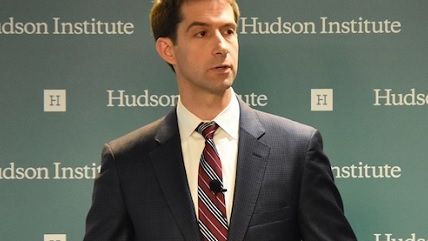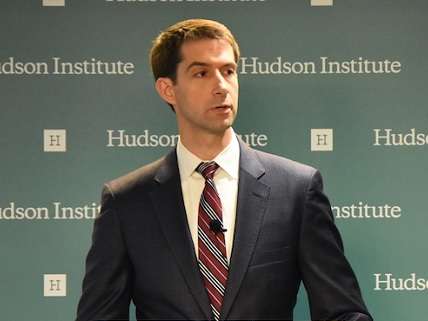Tom Cotton Says U.S. Facing an 'Under Incarceration' Problem, Slams Criminal Justice Reform as 'Criminal Leniency'
This guy.


Sen. Tom Cotton (R-Ark.) delivered remarks at the Hudson Institute today slamming criminal justice reform efforts as "criminal leniency," re-enforcing myths about the imagined "war on cops" and the link between aggressive policing and lower crime.
Cotton dismissed concerns about the U.S. prison population—the highest in the world—by pointing out that most property and violent crimes go unsolved. "If anything, we have an under-incarceration problem," he declared.
"Law and order in our communities doesn't arise spontaneously," Cotton said at the beginning of his remarks, noting it was police week and the "high cost" public safety comes with. "Men are not angels, after all." Except maybe cops. "Police officers put the badge on every morning, not knowing for sure if they'll come home at night to take it off," Cotton insisted. Law enforcement actually doesn't crack a list of the top 10 most dangerous occupations in the U.S, and cop killings were down in 2015 despite the "war on cop" rhetoric.
Later, Cotton said he had spoken to (an undetermined number of) police officers about (an undetermined number of) police brutality incidents, and "can report that they feel about abusive cops the way most soldiers feel about misconduct in the ranks: they're among the first who wish to see them disciplined." Military service members actually have to operate under stricter rules of engagement than police officers. Cotton served active duty army from 2005 to 2009. Other veterans are shocked by police abuse and the "domestic enemies" it might suggest.
"No officer wants to be involved in a justified use of force proven unnecessary after the fact, any more than soldiers in Iraq and Afghanistan wanted to make what proved to be the wrong decision in a shoot-don't-shoot situation," Cotton insisted, continuing the tellingly inappropriate analogy. "Those decisions, even if justified, live with you forever, believe me."
Cotton claimed the drop in crime over the last twenty years was thanks to tougher sentencing, like mandatory minimums, and aggressive policing, like "broken windows." The causal link is far from clear, and higher incarceration rates may have actually slowed the drop in crime.
Cotton mentions the drug war only when marveling at how remarkable it was that crime dropped after the "drug epidemic" of the 1980s. "That epidemic turned streets into literal battlefields, teenagers into foot soldiers, and too many citizens into casualties of the drug wars," Cotton insisted. Drug use is an essentially non-violent behavior—its violent trappings are introduced by the government's prohibition on it. Cotton complains that the sentencing reform effort led by Sens. Rand Paul (R-Ky.) and Cory Booker (D-NJ), applies to far more than just those imprisoned for offense like "mere drug possession."
In Cotton's world, a non-violent felon is more likely to plea down from a more serious offense ("Believe me," Cotton said, "most of them did) than to have been caught up by overzealous prosecutors or police officers.
Cotton's world: "Dedicated prosecutors toil long hours in our courts. Corrections officers and other professionals do the thankless work of administering punishment and, hopefully, providing a path for redemption." It's an aspirational view more than one rooted in reality, a view that leaves no room for prosecutorial misconduct or crooked or abusive prison officials, problems that criminal justice reforms seek to address and that the kind of rhetoric that calls such effort "criminal leniency" seeks to wave away.
Cotton mentioned the Clintons' stances on crime a number of times. He said the high crime rates that he attributed to "lenient" criminal justice were Hillary Clinton's context for talking about "super predators," revealing a shared rhetoric. Cotton credited Bill Clinton for responding to Black Lives Matter protesters by saying they were "defending the people who killed the lives you say matter." Clinton has been a target of protesters for signing the 1994 crime bill into law. He apologized for it last year.
"It's the police who are trying to protect those lives and prevent those murders," Cotton insisted. "What critics of vigilant policing miss is that communities—including minority communities—overwhelmingly approve of 'broken windows' tactics," Cotton pointed out. Cities such as Baltimore and Cleveland, which face problems of systemic police violence, have been run by Democratic politicians for generations, politicians who have pushed for and supported overpolicing in exchange for electoral success.
The problem of systemic police violence is not a byproduct of crime or crime-fighting but a system that protects bad cops through expansive privileges, encourages the zealous passage and enforcement of ever more petty laws, and demands public safety, not freedom or the protection of rights, be government's, and society's, top priority.
Toward the end, Cotton acknowledged the problem with "over-criminalization of private conduct under federal law," saying he was happy to work on "true criminal-justice reform," but such over-criminalization is intertwined with issues like mandatory minimums and the drug war Cotton provided full-throated support to in the same speech.
Other appropriate criminal-justice reform efforts for Cotton include making sure "prisons aren't anarchic jungles that endanger both inmates and corrections officers" and to "promote rehabilitation and reintegration for those who seek it." Whether Cotton will push for a crackdown on corrections unions which historically thwart reform remains to be seen.
No "pro-law and order" throwback would be complete without bellyaching over felons' right to vote. Cotton said he worried restoring the voting rights of felons who have served their sentence threatens, with recidivism, to create a "pro-crime constituency."
"An offender who automatically obtains the franchise will have little reason to buy back into the social contract and no motivation to re-learn the responsibilities of citizenship," Cotton argues. Cotton also argues against "Ban the Box" measures, pointing out that government prohibitions on employers asking about prior criminal history increases the burden on businesses and often simply mean a longer job application process before the eventual denial.
Instead, Cotton argues, felons should find jobs by proving they've reintegrated into society. Gainful employment is a reason to "re-learn the responsibilities of citizenship," if those responsibilities mean self-sufficiency and staying out of other people's business. The idea that there's any released felon out there who is holding it together to win back the right to vote, rather than out of a desire to have a job and stay out of trouble, is ridiculous. Referring to Virginia Gov. Terry McAuliffe (D) without mentioning him by name, Cotton bemoaned "erstwhile political operatives" who automatically restore felons' right to vote "for the electoral benefit of their political paymasters." Republicans concerned such restoration of rights is merely political posturing should demand felons who get their right to vote back get their right to bear arms back too.
Cotton also talked about the "Ferguson effect" (myth) and rejected the idea that the government should exercise fiscal discipline when it comes to law enforcement, asking what, other than national security, was more important for government to spend on.
Cotton closed by channeling his inner Dwight Schrute, the fascistic comic character in The Office who once said he'd rather a thousand innocent men be locked up than one guilty man roam free.
"Pardon me if I err on the side of being a little too tough on crime, rather than a little too soft on crime," the Senator who swore an oath to support and defend the Constitution proudly declared, "It's only innocent lives hanging in the balance, after all."


Show Comments (107)